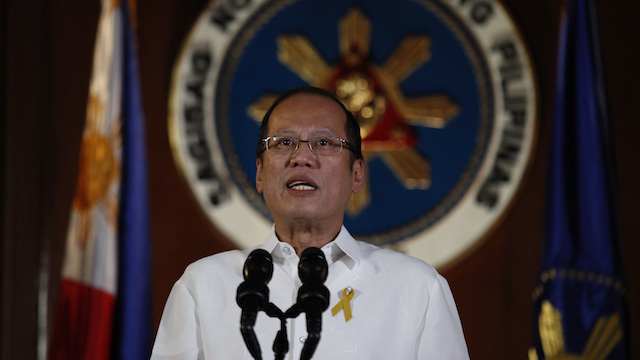SUMMARY
This is AI generated summarization, which may have errors. For context, always refer to the full article.

MANILA, Philippines – Filipinos believe that the Aquino administration is still not doing enough to ease inflation and poverty in the country, based on the latest survey results of an independent pollster.
On Monday, April 28, Pulse Asia Research Incorporated bared the results of its March 2014 Nationwide Survey on the Performance Ratings of the National Administration on Selected Issues conducted from March 19 to 26, 2014, among 1,200 adults.
The nationwide survey has a ± 3% error margin at the 95% confidence level, while subnational estimates for each of the geographic areas covered have a ± 6% error margin, also at 95% confidence level.
The survey gauged public approval of national government performance on 11 key issues – fight against crime, promotion of peace, law enforcement, fight against corruption, defense of territorial integrity, stopping environmental degradation, poverty alleviation, job creation, controlling inflation, improved workers’ pay, and curbing population growth.
“Filipinos are least inclined to approve of the administration’s efforts to control inflation (26%) and reduce poverty (30%),” Dr Ana Maria Tabunda, Pulse Asia research director, said in a statement.
The results show that 26% of Filipinos approve of government efforts to control inflation while 34% disapprove of it, for a net approval rating (NAR) of -8. This is an improvement over the -16 net rating it obtained in December 2013, the last survey period, when it scored 28% approval and 44% disapproval.
Controlling inflation is cited by 50% of Filipinos as an urgent issue.
In terms of poverty alleviation, 30% of Filipinos approved of government efforts, 26% disapproved, for a net rating of +4, higher than the previous net approval of -7 (31% approval, 38% disapproval).
“A considerable plurality of Filipinos cannot say if they approve or disapprove of the work done by the administration’s anti-poverty initiatives (43%),” Tabunda said.
‘Marked improvements’
The administration obtained majority approval ratings on two issues – fight against criminality (59%) and peace efforts (52%).
Tabunda said the plurality sentiment on a few other issues were also one of approval, namely, law enforcement (50%), fighting corruption in government (50%), defending the country’s territorial integrity (48%), and stopping environmental degradation (48%).
Tabunda cited “marked improvements” in the administration’s national performance ratings in March compared to December 2013, such as the 7-percentage-point increase in public approval for its environmental protection efforts, or from 41% in December to 48% in March.
She also noted an “easing” of criticism of government efforts on 5 issues during the survey period, most notably in poverty reduction, where public disapproval decreased by 12 percentage points, or from 38% in December to 26% in March and in anti-corruption efforts, from 30% to 19%, an 11-percentage-point improvement.
Public disapproval also eased in government performance in promoting peace, from 20% to 12% (8 percentage points); protecting the environment, 26% to 18% (8 percentage points), and controlling inflation, 44% to 34% (10 percentage points).
“It may also be noted that indecision toward the administration’s efforts to control inflation and reduce poverty becomes more pronounced during this period (+11 and +12 percentage points, respectively),” Tabunda said.
Government performance on defending the country’s territorial integrity against foreigners, which obtained 48% approval and 14% disapproval in March, was not included in the December survey.
On other issues included in the poll, the government’s approval rating on job creation remained at 41% in March, while disapproval decreased by 1 percentage point.
The government also improved its approval and disapproval ratings in controlling fast population growth at 5 percentage points (35% in December to 40% in March) and 6 percentage points (27% to 21%), respectively.
On increasing the pay of workers, public approval improved from 36% in December to 38% in March, while disapproval ebbed by 6 percentage points (from 29% to 23%).
Asked which among the issues in the poll are urgent, 50% of Filipinos cited controlling inflation, followed by improved workers’ pay (48%), fight against corruption (44%), poverty (34%), job creation (31%), fighting crime (23%), law enforcement (20%), environmental protection (18%), peace efforts (16%), and controlling population growth (15%).
During the survey period, among the major issues were the pork barrel scam probe, and the presentation of new witnesses, the arrest of Globe Asiatique president Delfin Lee for syndicated estafa, the arrest of Benito Tiamzon and wife Wilma Tiamzon, said to be leaders of the Communist Party of the Philippines and New People’s Army (CPP-NPA).
Other issues were the scheduled signing of the Comprehensive Agreement on the Bangsamoro between the Philippine government and the Moro Islamic Liberation Front (MILF), the Mindanao power crisis, and the Manila Electric Company’s (Meralco) refund to customers who paid the deferred electricity charges in their December 2013 and February 2014 bills.
There were also reports on Philippines-US negotiations on an enhanced defense cooperation agreement, posturing for the 2016 presidential race, the disappearance of Malaysian Airlines Flight MH370, the decision of the Supreme Court to postpone to April 2014 its ruling on the legality of the Reproductive Health (RH) law; and the Bureau of Internal Revenue’s shame campaign against professionals.
Tabunda said Pulse Asia “undertakes Ulat ng Bayan surveys on its own without any party singularly commissioning the research effort.” – Rappler.com
Add a comment
How does this make you feel?
There are no comments yet. Add your comment to start the conversation.